The number of vans on UK roads has grown to a record number in the last year, accounting for 11.4% of the total number of vehicles in use.
Motoparc data from the Society of Motor Manufacturers and Traders (SMMT) show that van ownership has grown by 1.7% to a total of more than 4.6m vehicle.
Overall vehicle numbers fell for the first time since the 2009 financial crisis, leaving a total of 40,350,715 vehicles on UK roads.
The number of heavy goods vehicles declined by 3.1% to 589,445 units. Bus and coach numbers saw the most significant fall at, dropping by 10.7% to 73,608, as the pandemic dramatically reduced already-declining passenger numbers causing fleet operators to pause new fleet purchases and take unused vehicles off the road.
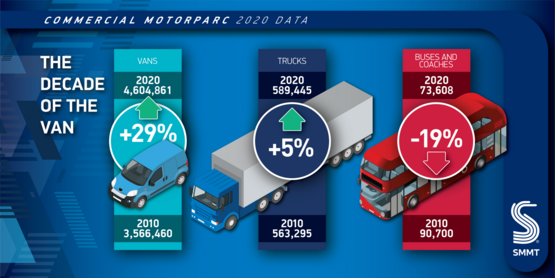
With showrooms closed for large periods of 2020 due to lockdowns, fewer new cars were registered, resulting in the oldest average car fleet since records began. The average car on UK roads was built in 2011, while almost 10 million cars have been in service since 2008 or earlier.
The SMMT said, while this is testament to the durability and quality of modern vehicles, an ageing fleet risks stalling the UK’s attempts to reduce emissions. It added that a new car from 2020 emits, on average, 112.8g/km of CO2, which is 18.3% better than a model registered in 2011.
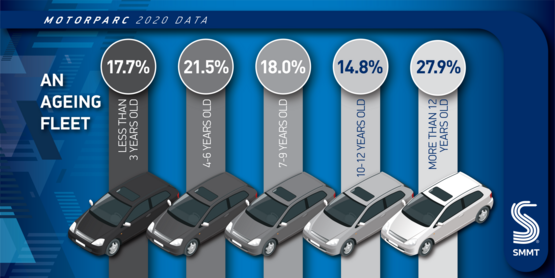
Fleet renewal is, therefore, essential if the UK is to reach its net zero target, with both conventional and alternatively fuelled vehicles having a significant role to play in the transition, according to the SMMT.
As part of the journey towards zero emission motoring, the number of battery electric vehicles (BEVs) on UK roads increased by 114.3% to a record high of 199,085, while plug-in hybrid vehicles (PHEVs) also saw their numbers increase by 35.2% to 239,510. However, combined, they represented just 1.3% of all cars on UK roads.
Hybrid electric vehicles (HEVs) saw their numbers grow by a fifth to 621,622 cars. Petrol car volumes remained stable, down 0.2%, with diesel falling 2.3%. Combined, internal combustion engine (ICE) models accounted for 97.1% of the total parc – or 34,018,599 units.
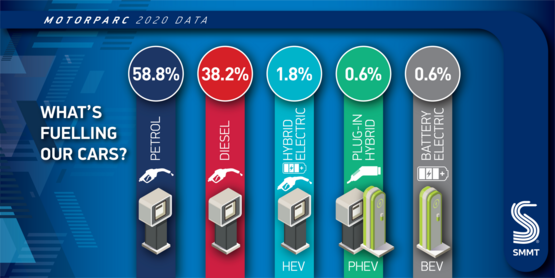
Mike Hawes, SMMT Chief Executive, said: “With the pandemic putting the brakes on new vehicle uptake in 2020, the average car on our roads is now the oldest since records began some 20 years ago, as drivers held on to their existing vehicles for longer. The technology is changing, however, albeit slowly. Despite massive growth last year, just one in 80 vehicles is a plug-in electric car – while nearly 10 million petrol and diesel cars dating back to before 2008 remain on our roads. Encouraging drivers to upgrade to the newest, cleanest lowest emission cars, regardless of fuel source, is essential for the UK to meet its ambitious climate change targets.”
Britain’s favourite car types are still the supermini and lower medium segments which account for six in 10 cars in service, at 11,620,733 and 9,256,839 units respectively. Dual purpose vehicles remain a distant third, with 4,619,061 in use but now account for 13.2% of cars on the road, as consumer tastes and demand shift.
















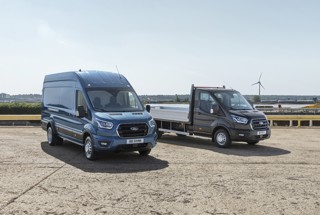

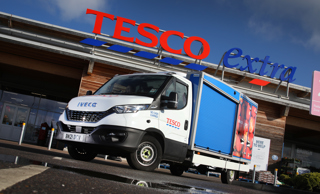
Login to comment
Comments
No comments have been made yet.